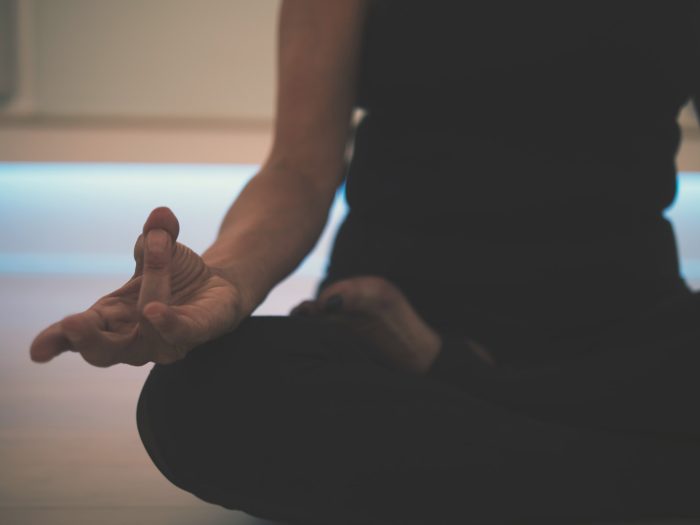If you are a daily or even regular practitioner of yoga, and you miss your asana practice because of travel, health challenges, family crisis, work deadline, or any gazillions of reasons life throws at you… it can feel a bit destabilizing.
I mean, we turn to the yoga mat to find our center and calm our minds, no? When we don’t have access to that practice, how do we continue to remain flexible off the mat?
A client felt embarrassed and confessed that she hadn’t practiced yoga asanas in 2.5 years—ever since her mom passed away. I reminded her that grief has a mind of its own. And the fact that she was self-aware, connected to her consciousness, felt compassionate, patient, and grateful…she was still practicing yoga. Being bendy on the mat is not the only way to practice yoga. In the west, we think of yoga as a sweaty workout, not the work in.
When I was new to my yoga practice, I would wonder if I stopped practicing yoga postures for a week, would I become rigid? My 20-something-year-old mind associated yoga with pushing myself to a point of pain. What I didn’t know at the time was that yoga is beyond asanas and inverting the body. There is a phrase in Sanskrit: “Yogas chitta vritti nirodha,” which means “Yoga is the stilling or controlling of the fluctuations of the mind.” My mind was a zoo of thoughts and emotions.
When my mother died nine years ago, I was seething with anger. I wanted answers and someone to blame. Speaking of Pitta imbalance (Ayurveda talk), I was not only filled with rage but also expectations of others. I acted like a victim whose pain was unseen and unheard. My father had become a widower, and my brother had also lost his mom. But I couldn’t get past my grief.
Mom died suddenly, which was a shock. I was in an airplane headed to meet her when she passed away. But I was upset that she didn’t wait for me. She was young, and I was younger. And I was a baby in my yoga practice…meaning, I had been showing up to the yoga mat for close to a decade by now, but my mind was non-yogic and rajasic.
Nine years later, when my father passed away, which was exactly a month ago, I felt the shift. I understood that he was my father, critic, confidant, friend, colleague, and an essential part of me. But he was also my brother’s dad. My sister-in-law and husband doted on him, and my father had a unique rapport with both. My nieces adored their “Dada” (paternal grandfather) and he loved them like none other. The pain was collective, and we were all experiencing loss. Not just us—our cousins, friends, and his staff members. I knew that there is no ranking in grief and suffering. My inner Self was connected to the Universal Self.
Yoga reiterated that neither can we be unhealthily attached to people, places, or activities nor can we become egotistical in our suffering. We must hold room for others and their grief. We have learned that yoga improves our strength and flexibility as well as sense of balance. Who is to say this is applicable to only physical postures?
The concepts of attachment and nonattachment are mentioned several times in The Yoga Sutras of Patanjali. In fact, Sutra 1.12 addresses two essential elements of yogic as well as life philosophy: abhyasa (practice or effort) and vairagya (nonattachment to the outcome of your efforts). Families will test these two principles in times of celebrations and crisis.
Even though I couldn’t get onto the yoga mat (I have written about how I lost my father and father-in-law inside of two days) since I was shuttling between cities, ICUs, cremations, rites, and families, my mind was calm. I knew yoga was working. In the Uber, I would close my eyes and reflect on the day and my feelings. The pratyahara (withdrawal of sense) and dhyana were yoga. When my mother-in-law behaved rudely because she was stressed, and I am the person most people in the family vent to, I stayed quiet and gave her a hug. Practice patience and remain nonattached to other people’s behavior. Watching my father-in-law hooked to complicated machines and gadgets in the ICU, I wished him to heal and prayed for his suffering to end. That’s yoga.
When my father couldn’t sleep all night, I would hold his hand and breathe deeply with him—that was yoga. One breath, one universe. I communicated with my brother, husband, and sister-in-law that there were a few non-negotiables because it mattered to our dad. He and I were close, and I knew exactly what and who would be of significance even in his end. But I communicated with love and inclusivity. Yoga was working.
My friends tell me that I am unusually calm despite the horror show that May 2023 was for my family. Ever since we have returned from India, we have had immense support from our friends and families in New York City. Between groceries, food, hugs, chai, flowers, dinners, laughter, tears, company, messages, and much more, we have never felt alone this past month. I don’t have expectations and only have gratitude. People have busy lives, yet they make time for us. My heart has been bursting with gratitude.
By the same token, when we need downtime (remember, my husband and I are grieving and consoling at the same time), I politely refuse company. My exhaustion is on a cellular level. Some days, I can hike, practice yoga, see clients, cook two meals; then, there are days every bone hurts. It’s not about building boundaries and taking care of only me. It’s also about being there for my husband and the people I care about. Why inflict my bad mood on others when I know it’s a transient feeling and a little rest and replenishment will recharge me?
You know yoga is working when you are good at discerning: who is not good for you (avoid meeting certain people) and who you might not be good for (if your grief feels triggered) in certain moments.
Ever since we have transitioned into our fatherless lives in NYC, I have been back on the mat and practicing asanas. But I am acutely aware that a crisis in life can happen when we might be in peaceful savasana.
You can plan all you want, but it’s equally important to not be attached to the outcome of your plans or efforts. This acceptance and no expectations bring peace. At that moment, you know that yoga is working.
“Yoga is not about touching your toes, it is about what you learn on the way down.” ~ Jigar Gor
~
Please consider Boosting our authors’ articles in their first week to help them win Elephant’s Ecosystem so they can get paid and write more.









Read 2 comments and reply